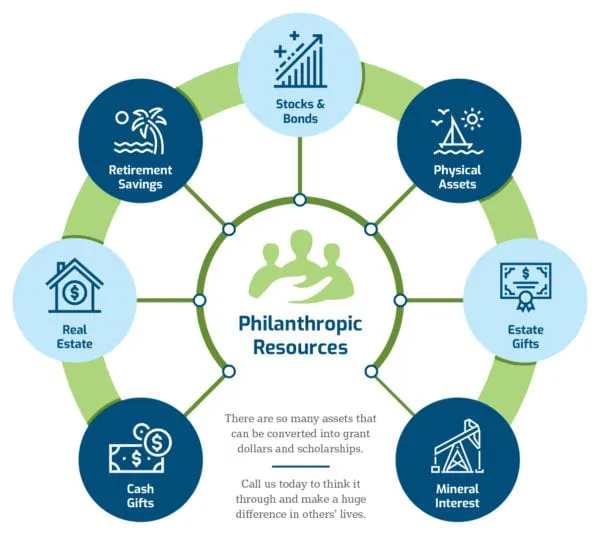Donor Privacy Policy
The Community Foundation of the Texas Hill Country maintains the confidentiality, integrity, and security of personal information pertaining to its current and potential donors’ contact and fund information.
In the course of regular business, the Community Foundation obtains personal information from applications or forms, transactional activity, and other sources with donor consent. All contact information is used for internal purposes only and never published. Please note that contact information is required by the IRS in regard to contributions, but it is not for public inspection. Fund names are sometimes published in the Foundation’s communication material and media, unless a donor chooses not to be listed. The Foundation does not sell, trade, or share its donor list with any individual or organization.
If you have questions about the Community Foundation’s Privacy Policy, please contact us.
Fund Types
We have many fund types available to help meet specific donor objectives. We are happy to provide advice, assistance, and materials to help donors and their advisors understand all of their options.
Asset Types

The Community Foundation accepts a wide range of asset types, including ones that many commercial brokerage firms are unable to accommodate. Often donors may not even be aware of the options available to them. We specialize in simplifying the process of converting assets into contributions.
Open A Fund
A fund is created by fully executing a fund agreement and making an initial gift to the Community Foundation. Please contact us to discuss your goals. Establishing a fund can be quickly and easily done.
Manage Your Fund
Managing your fund is easy in our online portal. Once signed in, you can see recent fund statements, make grant recommendations, donate, and review documents, like fund agreements. Everything you need is right there!
Log in to our Donor Portal here.
First time logging in? Please call our office for support.
Create A Legacy
For decades, we have worked with donors to create a legacy of generosity. An art center’s theatre, a wellness program for seniors, general support for an animal shelter, a new fleet of vans for the recreation center – these gifts and many others have all been funded by legacy donors whose vision and generosity live on.
The easiest way to assist charities with an estate gift is to include a provision in a will. When someone has an up-to-date will that they don’t want to change, a simple codicil can be signed, witnessed, and attached to an existing will.
The Community Foundation offers the following samples of language for wills and bequests. We have dozens of examples to share with you, if nothing below meets your specific goals. The Community Foundation’s EIN is 74-2225369.
Community Foundations vs. Private Foundations
You might wish to create a giving vehicle that allows for long-term involvement with your charitable assets. A Community Foundation fund enables donors to secure maximum tax deductions, include family members, focus grantmaking, and obtain visibility (or anonymity) for their giving. While some donors may find a private foundation meets their needs, establishing a fund with the Community Foundation often proves more attractive and much more cost-effective. Many local families have converted their private foundation to a donor-advised fund at the Community Foundation.
| PRIVATE FOUNDATION | Donor-advised Fund of The Community Foundation | |
|---|---|---|
| LEGAL IDENTITY | Separate nonprofit entity | [Donor’s Choice of Name] Fund of the Community Foundation |
| TAX STATUS | Private foundation | Public charity |
| TAXATION OF INVESTMENT INCOME | 2% annually | None |
| PAYOUT REQUIREMENT | Grants must equal 5% of corpus annually | None |
| DEDUCTIBILITY OF GIFTS | Deductibility: 20% AGI for appreciated property, 30% AGI for cash | Deductibility: 30% AGI for appreciated property, 50% AGI for cash |
| ADMINISTRATION | Detailed annual filing with IRS | All record-keeping and accounting carried out by the Community Foundation |
| GRANTMAKING EXPERTISE | Professional staff, if any (unusual for a small foundation) | The Community Foundation staff review and monitor proposals, transact all distributions. |
| CONTROL | Trustees have complete control of distributions and responsibility for asset management. | Donor-advisor may make grant recommendations. |
| COST | Costs include annual legal and accounting fees, insurance, investment management, office space, staff, and miscellaneous expenses. | No cost to establish. Annual fees range from 1% to 2%, depending on fund type. |
Establishing a fund with the Community Foundation of the Texas Hill Country has many advantages over a private foundation.
Cost
Private Foundation
- A private foundation can be both time-consuming and costly to establish.
- For economic operations, a private foundation needs to have substantial assets. Studies continually show that assets under $25 million are better served in a donor-advised fund, from a cost perspective.
The Community Foundation
- Establishing your own fund with the Community Foundation is inexpensive and easy to set up.
- Only $7,500 is needed to begin a Fund with the Community Foundation.
Tax Filings & Liability
Private Foundation
- A private foundation must prepare its own detailed federal tax return (Form 990PF) with required supporting schedules and must report to the state as well.
- A private foundation is subject to an annual excise tax of up to 2% on net investment, including net capital gains.
The Community Foundation
- All Funds of the Community Foundation are component funds and are included in the Foundation's annual Form 990 to the Internal Revenue Service. This represents a further reduction in expenses.
- The Community Foundation is a tax-exempt entity and all gifts to it are tax-deductible because it is a 501(c)(3) public charity.
Tax Advantages
Private Foundation
Tax treatment is not as favorable:
- Deduction for gifts of cash is limited to 30% of Adjusted Gross Income (AGI).
- For gifts of appreciated property the deduction is limited to 20% of AGI.
- Gifts of publicly traded stock are deductible at their Fair Market Value (FMV).
- Other appreciated property can be deducted on a basis value.
A new private foundation must establish its tax-exempt status, which can take several months to obtain.
The Community Foundation
A donor can enjoy maximum tax advantages:
- Deduction for gifts of cash is limited to 50% of AGI.
- The full market value of appreciated property is deductible from income up to 30% of AGI.
- Gifts of publicly traded stock are deductible at their FMV - no time limitations.
- Other appreciated property can be deducted for the FMV.
The Community Foundation already has a favorable tax-exempt ruling from the IRS, so contributions are immediately deductible.
Operations & Administration
Managing a foundation is an on-going administrative task with annual compliance reporting and expenses.
Private Foundation
- Administration can be costly and time-consuming.
- A private foundation does not qualify for public charity status.
- Complete donor control over the fund's use is permitted.
- A new private foundation must establish and obtain the following:
- A mechanism for receiving and managing gifts of real estate, securities, and cash.
- A means of evaluating requests for grants from nonprofit agencies.
- A system for verifying the tax exempt status of grantees.
- Qualified professional and support staff.
- Office space and equipment.
- Knowledge of the needs of the community.
The Community Foundation
- Administrative costs are shared by all funds and, therefore, kept at a minimum for individual funds.
- The Community Foundation meets the IRS's "public support test," thereby qualifying as a public charity.
- Donor-advised funds are the most flexible funds in the Community Foundation.
- As an established organization, the Community Foundation has the following developed and in place:
- A mechanism for receiving and managing gifts of real estate, securities, and cash.
- A means of evaluating requests for grants from nonprofit agencies.
- A system for verifying the tax-exempt status of grantees.
- Qualified professional and support staff.
- Office space and equipment.
- Knowledge of the needs of the community.
Monitoring and Oversight
There are strict regulations regarding self-dealing between a private foundation and those who manage, control or contribute to it and persons or corporations closely related to them.
Private Foundation
- A private foundation that makes grants to other private foundations or new charitable agencies or awards scholarships that have not received public charity status is subject to federal monitoring and reporting requirements.
The Community Foundation
- The Community Foundation must be able to demonstrate that its money is being used for charitable purposes, but does not need to report such information to the federal government.
Public Disclosure
Private Foundation
- Private foundation's tax return, along with those of its contributors, must be open to public inspection for six months.
The Community Foundation
- Even though the Foundation’s tax returns are published on its website and open to public inspection, all donor funds are anonymous.
Payout Requirements
Private Foundation
- A private foundation must pay annually for charitable purposes a minimum 5% of its net asset value, regardless of earnings.
The Community Foundation
- The Community Foundation does not have minimum payout requirements; therefore, the Community Foundation can be more flexible in accepting gifts such as undeveloped real estate or other assets that produce little or no current income.
Investment
Private Foundation
- A private foundation must research and secure its investment vehicles.
The Community Foundation
- The Community Foundation invests in a balanced portfolio with investment managers it has worked with for many years. The Foundation’s Investment Committee meets on a quarterly basis to oversee its investments and the managers.
Purpose
Private Foundation
- Expensive court proceedings may be required to change the original restricted purpose, if it becomes outdated.
The Community Foundation
- If the named charity or restricted purpose is no longer active or providing a needed service, or if the gift becomes impractical or impossible to fulfill, then the Community Foundation’s Board of Trustees has variance power to select another charitable recipient with a similar purpose.
Give to Donor Funds
The Community Foundation is home to over 200 charitable funds, each created by a donor's philanthropic vision. Of those funds, many accept donations from the public, and they are available here.
Sisterhood For Good
Women's giving circles based in Fredericksburg and Kerrville. Click here to learn more.
Tools & Resources
One of the Foundation's goals is to empower donors. The Foundation provides advice, tools, and resources to help donors learn more about the charitable sector as well as specific nonprofit organizations.
You can also:
- Review nonprofits' tax returns (Form 990) or financials on Guidestar.
- Compare nonprofits or learn more about their internal workings with Charity Navigator.
- Consult the IRS for nonprofit addresses and updated standings using the IRS Charity Database.


 Pictured: Local farm and ranch realtor, Jimmy Reno, and his wife, Carmen, use their donor-advised fund to annually donate to local charitable causes.
Pictured: Local farm and ranch realtor, Jimmy Reno, and his wife, Carmen, use their donor-advised fund to annually donate to local charitable causes.

 A scholarship fund lets donors establish criteria and determine their own degree of involvement while supporting students of any age, background, or education level. The Community Foundation administers scholarship funds for donors, nonprofit organizations, civic clubs, and businesses.
A scholarship fund lets donors establish criteria and determine their own degree of involvement while supporting students of any age, background, or education level. The Community Foundation administers scholarship funds for donors, nonprofit organizations, civic clubs, and businesses. A gift of commercial, residential, farm, or ranch real estate owned for more than a year entitles the owner to a tax deduction for the property’s full fair market value while allowing the owner to avoid capital gains taxes.
A gift of commercial, residential, farm, or ranch real estate owned for more than a year entitles the owner to a tax deduction for the property’s full fair market value while allowing the owner to avoid capital gains taxes.